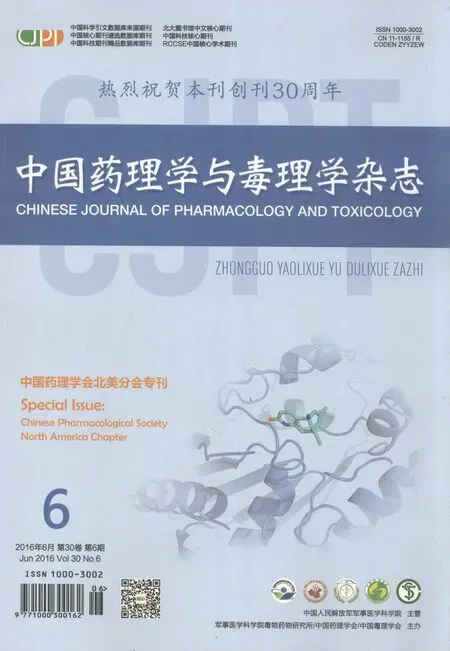GUEST EDITOR′S COMMENTARY
2016-02-01ZhongpingFENG
Zhong-ping FENG
(Department of Physiology,University of Toronto,1 King′s College Circle,Toronto,Ontario, Canada M5S 1A8)
GUEST EDITOR′S COMMENTARY
Zhong-ping FENG
(Department of Physiology,University of Toronto,1 King′s College Circle,Toronto,Ontario, Canada M5S 1A8)
This peer-reviewed special issue of the Chinese Journal Pharmacology and Toxicology is one of the initiatives of the Chinese Pharmacological Society(CPS)North America Chapter(NAC),which was officially established and announced during the 30th Anniversary Celebration of the Chinese Pharmacological Society in November 2015 at Beijing,China.
NAC is a non-profit and non-political scientific organization located in the North America(United States,Canada,and Moxico)and directly affiliated with the CPS(http://www.cnphars.org/introduction. asp).NAC has been led by the President Dr.Dayue Darrel DUAN(MD,PhD&FAHA),a Tenured Professor in the Department of Pharmacology at the University of Nevada School of Medicine,and an internationally renowned cardiovascular pharmacologist.The other members of the NAC Executive Committee include the Executive Vice President Dr.Chun-xiang Kevin ZHANG,an Endowed Chair Professor and the Chairman of the Department of Pharmacology at Rush University Medical Center (Chicago,USA);the Vice-President Dr.Zhong-ping FENG,a Tenured Professor in the Department of Physiology and the Director of the Collaborative Program In Neuroscience at the University of Toronto (Toronto,ON,Canada);the General Secretary Dr.Hong-shuo SUN,a Tenured Associate Professor in Departments of Surgery and Pharmacology at the University of Toronto(Toronto,ON,Canada);the Treasure Dr.Ke-li HU,a Tenured Associate Professor in the College of Pharmacy at the Ohio State University(Ohio,USA),and the Directors:Dr.Yan-feng CHEN,a Tenured Professor in the Department of Pharmacology&Toxicology at the Boonshoft School of Medicine in Wright State University(Dayton, ON USA);Dr.Guo-chang FAN,an Associate Professor in the Department of Pharmacology and Cell Biophysics at the University of Cincinnati(USA);Dr Jin J LUO,a Professor in the Department of Pharmacology at Lewis Katz School of Medicine at Temple University(Philadelphia,USA); Dr.Guang-yu WU,a Tenured Professor in the Department of Pharmacology and Toxicology,Medical College of Georgia,Georgia Regents University(USA),and Dr.Han-ting ZHANG,a Professor of Pharmacology at School of Pharmacy,Taishan Medical University(Taian,Shandong,China),and an Associate Professor in Departments of Behavioral Medicine&Psychiatry and Physiology&Pharmacology, West Virginia University School of Medicine,Morgantown,WV,USA(Morgantown,WV USA).
The mission of the NAC is to provide a special platform and effective mechanism for promoting international collaboration and exchange in pharmacological education,research,and drug development,and for increasing collaborations between members in North America and in China.We aim to establish the membership with the North America,provide leadership in scientific communication and interactions among pharmacology professions and advocacy for training programs of pharmacological sciences in both academic and industrial settings in North America,promote and support career development of the members,bridge the communication between the CPS and the pharmacological community in North America,facilitate collaborations among scholars with Chinese heritages and others who agree with and support the mission of the NAC,and promote NAC at local,national and international levels. The NAC also supports and promotes the publications of CPS journals,and promotes the effort in the development of precision medicine.
This specific issue,contributed by the NAC members from the United States of American and Canada,covers critical topics in neuroscience,endocrinology,and cardiovascular research in pharmacology and toxicology and discusses the current understanding and research advancement in these fields. The highlights of these papers are briefed below.
Yu-feng TONG in his commentary pointed out the importance of ubiquitin-signaling pathway in drug discovery,proposed the criteria of a high quality chemical probe and the strategies to target ubiquitinspecific proteases using structural biology approaches.
Han-ting ZHANG and his group reported that new findings on the reversal effects of desipramine (DMI)on resistance to anti-tumor drug temozolimide(TMZ)in cell lines,U251/TR cells.They demonstrated that DMI enhances cytotoxicity effect of TMZ via CHOP-dependent apoptosis pathway,thus providing the basis for using combination of DMI and TMZ in treatment of advanced glioma cancer.
Nancy DONG and Zhong-ping FENG reviewed the current understanding of the role of calciumactivated potassium channels(KCa)in spontaneous rhythmic activities of pacemaker neurons.The authors emphasized that effects of the channel modulators specific to the big-conductance(BK)and small-conductance(SK)channels and their therapeutic potentials in neurological disorders such as Parkinson′s disease.Ji-sun KIM,Vivian SZETO and Zhong-ping FENG reviewed the critical role of calcium signaling in neuronal development,summarized the cytoplasmic calcium channels,and the calcium conducting channels(ryanodine receptor and IP3receptor channels)on the endoplastic reticulum in growth cones of growing neurons,and emphasized the uses of modulators of L-type calcium channels, ryanodine receptors and IP3receptors as potential drug targets in treatment of neurodevelopmental
disorders.
Hong-shuo SUN and his group summarized the contribution of TRPM2 channels in Alzheimer diseases related pathology and discussed the potential research directions in developing selective TRPM2 channel modulators for neurodegenerative disorders.
Ying XU and her group reviewed the role of dynamic related protein 1(Drp1)in mitochondrial division and emphasized that Drp1 may be a critical target for preventing memory loss associated with Alzheimer disease.
Jian-feng LIU and Jun-xu LI reviewed the current understanding of drug reward memory using drug-induced conditioned place preference as an example and commented on the potential application of drug reward memory for future drug development in reducing the risk of relapse to addictive drug.
Tian-ru JI introduced the incretin hormone glucagon-like peptide-1(GLP-1),discussed the nutritional regulation of GLP-1 secretion and reviewed the key regulatory mechanisms of production which are critical for metabolic regulation.
Taken together,we aim to highlight the new directions of drug development in the neural developmental and degenerative disorders,and metabolic disorders,and thus providing future potential therapeutic strategies.
Finally,I would like thank Dr.Hong QIAO and her team for their assistants to ensure this issue published on time.
杂志排行
中国药理学与毒理学杂志的其它文章
- Incretin hormone glucagon-like peptide 1 and gut microbiota
- Drug reward memory:implication from drug-induced conditioned place preference model
- Pathological role of transient receptor potential melastatin member 2 channel in neurodegenerative diseases and Alzheimer disease
- Effects of calcium channel blockers on growth cone and their clinical implications
- Reversal effects of desipramine on resistance of U251/TR cells to temozolomide
- Role of calcium-activated potassium channels in neuronal pacemaker activity
